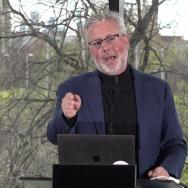University of Chicago Prof. Neil Shubin has been nominated to serve as the next president of the National Academy of Sciences, an organization that addresses some of most pressing challenges facing the nation and world. The Council of the National Academy of Sciences selected the renowned evolutionary biologist to succeed Marcia McNutt when her term as president ends June 30, 2026.
"I’m honored and excited to be nominated to lead the National Academy of Sciences. For over 160 years the Academy has recognized and convened the world’s leading experts to advise our government on science-related matters,” said Shubin, the Robert R. Bensley Distinguished Service Professor of Organismal Biology and Anatomy, who has been a member of the National Academy of Sciences since 2011. “I look forward to continuing this critical work at a time when both the knowledge of science and the use of it in decision making becomes essential for our well-being and national competitiveness.
Shubin is a groundbreaking scholar, educator, author and science communicator who has led fossil hunting expeditions around the world. Among his pioneering discoveries was a 375-million-year-old fossil called Tiktaalik roseae—an important transitional form between fish and land animals. Tiktaalik was the subject of two popular science books: the best-selling Your Inner Fish (2008), which was made into an Emmy Award-winning PBS series; and The Universe Within: The Deep History of the Human Body (2013).
“Neil Shubin is a rare scientist and leader, with a long record of pathbreaking scientific discovery and a special talent for engaging with the public. His dedication to science and public engagements have long enriched the University of Chicago community,” said University of Chicago President Paul Alivisatos, a member of the National Academy of Sciences. “I am thrilled that he will be leading the National Academy of Sciences. I believe he will do much to serve our nation in his role and that he will do much to advance scientific research and public understanding.”
Shubin leads a dynamic research lab at UChicago—a molecular biology and paleontology laboratory where researchers experiment with embryos from sharks, paddlefish and other species. As an educator, Shubin has inspired many students to pursue developmental biology research and has advised trainees from fields including paleontology and engineering. He also teaches a course based on Your Inner Fish to non-biology majors.
He currently serves as associate dean of basic science research and academic strategy at UChicago; previously he held senior leadership positions at the Marine Biological Laboratory in Woods Hole and the Field Museum in Chicago.
“From his fascinating discoveries on the evolutionary origins of limbs to his work popularizing the wonders of science through his books and television series, Neil Shubin is an exemplary scientist and public intellectual,” said Mark Anderson, dean of UChicago’s Biological Sciences Division and Pritzker School of Medicine, who serves as Executive Vice President for Medical Affairs. “As a longtime faculty leader and associate dean for basic science at UChicago, he will bring his leadership skills, organizational acumen, and scientific vision to the National Academy of Sciences and be a compelling, dynamic voice to advocate for the value of rigorous, independent science.”
A member of the UChicago faculty since 2000, Shubin was previously on the faculty of the University of Pennsylvania. Shubin is an associate editor and member of the editorial board of the Proceedings of the National Academy of Sciences and chairs the advisory board of LabX, an NAS public engagement program designed to pursue creative approaches to effective science communication. He holds numerous distinctions and honors, including receiving the Roy Chapman Andrews Society Distinguished Explorer Award in 2019 and the 2024 Viktor Hamburger Outstanding Educator Prize.
Shubin earned his bachelor’s degree in biology from Columbia University in 1982 and a Ph.D. in organismic and evolutionary biology from Harvard University in 1987. He did his postdoctoral work at the University of California, Berkeley.
About the National Academy of Sciences:
The National Academy of Sciences is a private, nonprofit institution that was established under a congressional charter signed by President Abraham Lincoln in 1863. It recognizes achievement in science by election to membership, and—with the National Academy of Engineering and the National Academy of Medicine—provides science, engineering, and health policy advice to the federal government and other organizations. Members of the Academy are elected by their peers for outstanding contributions to research. The membership includes approximately 2,600 active members and 550 international members, with a total of 190 members having been awarded Nobel Prizes.

